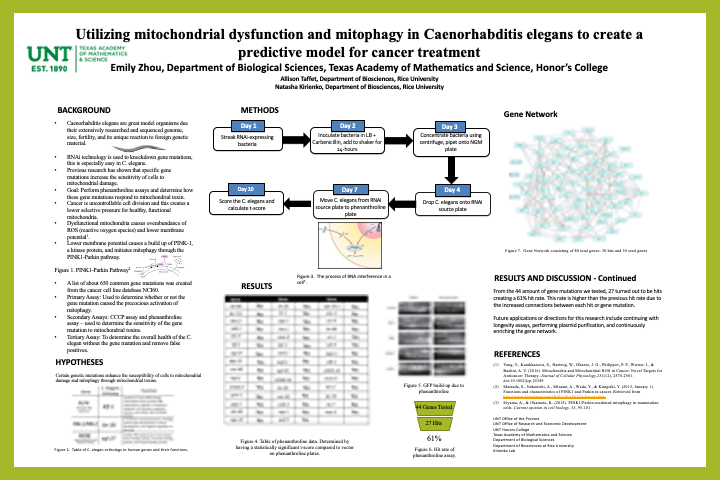First Name:
EmilyLast Name:
ZhouMentor:
Dr. Natasha KirienkoAbstract:
Caenorhabditis elegans are excellent model organisms for neurological, developmental, and genetic research due to the availability of its complete genome sequence, size, transparency, and fertility. Additionally, the genome of C. elegans contains many functional human counterparts, making C. elegans an essential experimental model for human diseases, especially cancer. In order to identify the effect of common cancer mutations, genes can be silenced using RNAi technology. Fortunately, due to their response to foreign genetic material, gene silencing is both convenient and cost-efficient in C. elegans. Since C. elegans contain RNA-dependent RNA polymerase (RdRP), C. elegans can efficiently amplify dsRNA and siRNA production and eventually knockdown the gene mutation.
Previous data from Kirienko lab indicated that certain gene mutations increased the sensitivity of cells to mitochondrial damage. Three assays were then performed to determine which of these gene mutations increased the sensitivity of the mitochondrial to mitochondrial damaging drugs. The primary assay was used to determine whether or not the gene mutation precociously activated mitophagy. The secondary assays were used to determine the gene mutations relationship with mitocans. Finally, the tertiary assay was used to determine whether or not the silenced gene mutation affected the longevity of the nematode. All in all, currently from about 44 gene mutations, we have determined that 27 gene mutations are hits. Ultimately, from this research experience, we hope to create a genetic network that predicts sensitivity to mitochondrial damage, which can be used to optimize cancer treatment
Poster:





